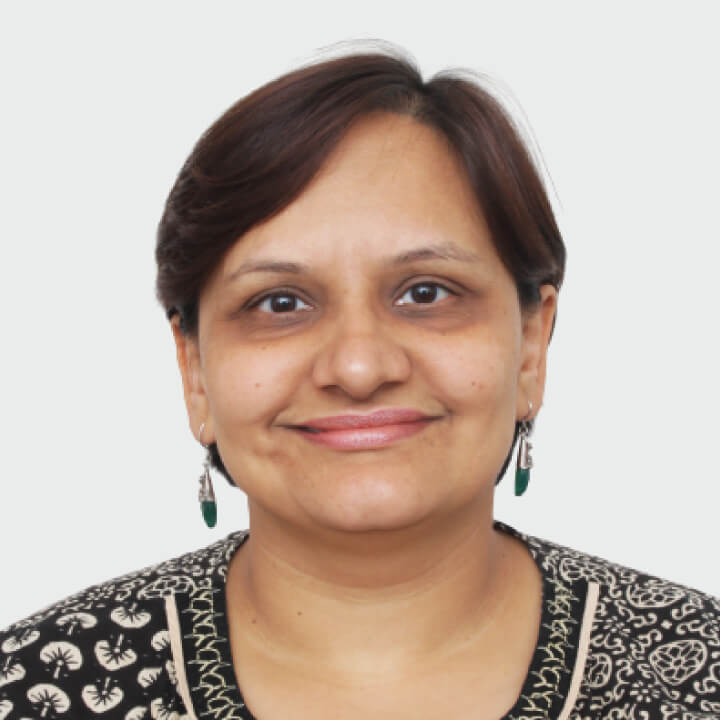Episode 7: The New India: Modern Tech, Global Future
India has been emerging as a global tech and business powerhouse, seamlessly blending ancient traditions with cutting-edge innovation. In this episode, Anni sits down with Sheetal Kale, Head of DataArt India, to explore the Indian tech ecosystem, the rise of AI, the ongoing IPO boom, and India’s growing influence in global decision-making. Plus, learn how women in Indian tech are driving change and why the country's IT industry is becoming a key player on the world stage.
Key Takeaways
✓ Historical Context: India was once primarily known as an IT outsourcing hub, valued for its cost-effectiveness and transactional tech services, but with limited global recognition for its innovation and diverse talent pool.
✓ Current Landscape: India's technology sector is experiencing unprecedented growth, driven by a strong educational system, vast data resources, and major investments in AI and tech infrastructure. With its cultural and demographic diversity, India is emerging as a global leader in innovation.
✓ Anticipated Trends: The future of Indian tech points towards global leadership, especially in AI and entrepreneurship. This transformation is reshaping India’s role from a service provider to an innovation powerhouse, driving diversity in technology and fueling international collaboration beyond traditional boundaries.
Transcript
Anni Tabagua: Welcome back to BizTech Forward, a podcast where we chat about technology and business with some of the brightest minds at DataArt. I'm your host, Anni, and today we are traveling to one of the most dynamic and fascinating places on earth, India. India is shaping itself as a global power center right now. But what does this new India really feel like?
Why is it capturing the world's attention, and how is it impacting technology and business? I'll admit I'm quite ignorant of most of this, so please bear with me. I'm really looking forward to learning along with our guest. Joining me to tackle these questions is Sheetal Kale, Head of DataArt India. Hi, Sheetal. I'm so happy to have you here with us.
Sheetal Kale: Hi, Anni. My pleasure.
Anni Tabagua: Sheetal has over 30 years of experience in organizational development and operations. She practices a servant leadership style, guiding her teams with empathy and support. Her career includes key roles in industries such as pharma, ad tech, skincare, and IT services. With a strong learner mindset, she loves tackling new challenges and roles. Again, welcome to the show.
Sheetal Kale: Thank you.
Anni Tabagua: Okay, so let's get right into it. Sheetal, I want to start with the basics. So, India is where ancient and supermodern coexist in incredible ways. Really? So, for someone like me who might only see this on a surface level, what is the essence of this new India that is emerging?
Sheetal Kale: Well, that's a really nice question, Anni. And, as you rightly said, it is true that even as we get on to the next century, I would say, or even the late 21st century that we are in now, India does have this kind of coexistence of modern with things that are from the past, historically very spiritual or, you know, they kind of coexist.
This kind of coexistence really drives a lot of innovation and agility that we see in India today. We do see the old and the new together. For example, we have a beautiful metro system—one of the top-notch metro systems in Delhi. But when we enter a metro or one of these trains, along with this savvy technology, we do see a lot of Indian artwork, sculptures, and people.
The government or the people who develop these systems try to keep a little Indianness to the whole story. And, actually, if one travels—and I invite you to come to Bangalore anytime—the new international airport that Bangalore has is so beautiful. It's an example of old and new. We have one of the best technologies at the airport.
But if you walk through the airports, you will see waterfalls, artifacts, artworks, and sculptures. There could also be a little, beautifully made temple in the airport. So, it's a nice coexistence of the old and new.
Anni Tabagua: Wow. I love how you describe it. So, you can actually find a lot of digital nomads and expats working in some cool startup next to a century-old temple or something.
Sheetal Kale: Oh, yes. I would say so that, you know, let's say if there's an AI startup or even a company in an IT district, you will maybe have a very old temple next door to it. We are all together in this.
Anni Tabagua: So, it's like India is really pulling the world in with this balance. Kind of. And I remember hearing you say once that India has sort of this gravitational pull. And I really loved how you phrased it. So, could you expand a little bit on that?
Sheetal Kale: Yeah, Anni, what happens is that there truly is a gravitational pull towards India now. And why do we see this gravitational pull, actually? I feel that it is a mix of the talent that we have today in India, the market potential that we are seeing in India, the economy that is booming in India, and the innovation that we see in India.
So, all these things together are kind of inviting people to India. And to add, India is now not just the supplier of IT as it was very famously known for, but it has now become a big client for tech solutions on its own. And so, what happens is this kind of a flip we see in the global tech industry today. And India seems to be at the forefront of it, not at the back end, or as just a plain outsourcer as it was earlier.
Anni Tabagua: Right? Actually, Sheetal, I keep saying "New India," New India. And just for reference, when do you think this new India started to emerge? Really?
Sheetal Kale: That's a good question. So, I think, as we started seeing talent in the country, as we started seeing the educational system getting robust within the country, as we started seeing English as a global language for communication to be part and parcel of our education, as we started seeing tech and AI coming into the Indian tech space, I think we started noticing that India is now coming to the forefront rather than just being behind.
Anni Tabagua: Right. A little bridge to what I want to talk to you about next is technology. So, can we spend some time discussing technology in India right now? Of course, all over the world, but in India as well. Very much so. AI and data seem to be going crazy. Pretty much, though. I wonder what's driving this boom in India. Maybe the government is investing heavily in AI, or is it because you guys prefer to build many new solutions and not modernize the old systems? So, what would you say about that?
Sheetal Kale: Interesting. That's a good question. And I was just thinking, so coming to the AI part, AI data, let's consider data now with its massive population, massive segmentation of talent, infra, people, cultures, diversity. India gets a lot of data, and to add on, I would say we are one of the most affordable countries for internet and mobile device use.
So, all these things together bring an enormous amount of data. This data, I would say, is like platinum for our AI development because all this data, which is within the country, can be utilized for development, applications, and little A/B testing of various products.
All these things bring in a lot of data within the country. Secondly, the government of India, the private sector, and the public sector are definitely heavily investing to see how we can drive AI solutions. I would say this is for an agricultural-rich country, so in agriculture, healthcare, urban planning, edtech, and health tech.
So, all these things together help us drive AI in a very big way in this country. And I wouldn't say that we only believe in modernizing legacy systems or old systems. This brink that we are in the AI revolution is helping us move ahead with entirely new solutions.
So, we are at the cusp where we want to take the leap forward to go ahead in tech and AI specifically. I hope I've answered your question right.
Anni Tabagua: Yeah, very much so. I wonder if you can give us a little example of this leap in tech, something we could relate to, maybe paint a picture.
Sheetal Kale: Okay, so let me think of Bangalore. Bangalore is quite infamous for traffic congestion and daily snarls. And how has AI helped alleviate all these traffic woes? The Bangalore police have introduced a system called Bat Box. Now, what does this system specifically do?
It basically has AI-powered sensors and cameras placed at traffic signals and lights. These AI sensor cameras and systems collect real-time traffic data. This real-time data is then looked into in the back end on a real-time basis. It is then used to optimize traffic flow and reduce delays in a city like Bangalore. Of course, there is a lot to be done.
Still, these kinds of systems are currently prevalent in 3 or 4 places in Bangalore. There is a necessity and a plan that by 2025, we should have 60 to 60 choke points in this city with the system. I'm sure that's going to help us with real-time traffic decongestion.
And now, coming to India, India is still a very agriculture-heavy country. About 59% of our country's total workforce still depends on agriculture and stays in rural areas. And here, how does AI help? You know, there are these companies, like CropIn, specifically. Actually, I visited the Bangalore Tech summit just three days back, and I did see this company there, too, along with so many other companies that are doing AI-led work in agrotech.
So, what does a company like CropIn do? Basically, they utilize AI and offer predictive analysis, weather forecasting, and a view of pest and disease outbreaks. They also give alerts to farmers and irrigation advice. So, all these kinds of things together help us make smarter agrotech decisions.
The farmer on the ground can decide whether a storm is coming in, whether locusts are attacking, or whether he needs to protect his farmland from natural conditions. So, these are some examples, I would say, that are helping us in agrotech and urban planning. And, of course, there are many more.
Anni Tabagua: Thank you. All these examples are great and vivid, they really do the job of painting the picture. And it does feel like roles are really flipping. You mentioned already, but India is no longer just a back-office powerhouse; it's actually a decision-making center for technology and transformation. And you said that India has become a client, not only a supplier. So, what is driving this shift? I want to hear a little bit more about that.
Sheetal Kale: So, Anni, as you rightly said, yes, India is now coming as a frontrunner in tech. What are the signals that we get as to why it has become a frontrunner and a game-changer in the current times? One of the strong signals, of course, is from AI. AI seems to be that game-changer that will make India more of a frontrunner, more of an innovator, and more of a leader instead of just its back-office or outsourcing tag.
If we look at technology in general, what's happening is the vast talent pool that we see in India that kind of offers us that edge, along with the digital public infrastructure that we see, the highest number of mobile users, the highest number of people using the internet. So, all these factors help us drive India to be at the forefront. In addition, I would like to bring the people aspect to this, too.
India is a country, of course, but within one India, we see so many Indias. Why do I say that? It is solely because we are a conglomerate of different languages, levels of digital literacy, different levels of education, and different cultures. What happens is that we have so much diversity in our own people, and if we can make AI accessible to all these people, we understand that there are way too many real challenges on the ground in this country.
If we have successfully brought Google Maps to the smallest lane in Bangalore or the tiniest lane in a tier-three city in the country, I think that is the greatest thing we could do because of AI.
If we can do this within this vast country, I think we can easily do it on a global level. This diversity of languages, tech talent, and digital literacy allows India or people in India to innovate, and this allows people to innovate with a focus on inclusivity, ensuring that solutions are developed in such a robust way that they can handle real-life situations.
They can handle far too many scenarios or diverse issues, which we may not see in other developed countries. This kind of agility, strength, and new energy is seen through our AI initiatives and tech in general.
Anni Tabagua: That's great. I can hear the energy even in how you speak in your voice. That's really refreshing. And one more thing I wanted to ask: I've been reading a lot of what media is covering these days, and there seems to be a whole IPO boom right now in India. So, I wonder, how come? Is that part of the same trend, or what's going on IPO-wise?
Sheetal Kale: Wow. IPO boom. Yes. Absolutely. You got it right that an IPO boom is happening in India for Indian companies and India-led companies. And there are multiple reasons. It wouldn't be only because of the tech boom we see. But what's happening is a confluence of a lot of things that we see, which is bringing in this IPO boom. One of the interesting and most important things I would say is our economic strength these days. We are projected to grow at around 6.9 to 7.4% in 2024.
We still seem to be growing in 2024 and beyond, which is one strength that leads to a good IPO boom. Besides this, the Indian stock market—the Bombay Stock Exchange or the Mumbai Stock Exchange, the Sensex—is very robust and healthy, and there is a positive sentiment.
I always say that even the stock exchange has sentiment because, ultimately, it's about funds and money, but people's sentiment drives all this. That's why I feel there is a positive sentiment towards the stock exchange, the BSE, and, of course, the economic strength.
Beyond this, there's market enthusiasm today. As a layman, if I'm moving in the markets of cities, towns, or tier-three cities, I don't see any wavering or downward trend of people not opening their pockets to buy something. There still is that positivity in the market. Besides this, what do we see?
We see that a lot of global investments and capital reallocation are coming into India, which again helps in the IPO boom. Then, the government, the regulatory schemes, and the monetary policies are all pro-India and pro-IPO. So all these kinds of positive sentiments put together show that the IPO boom in manufacturing, agriculture, healthcare, e-commerce, retail, and, of course, IT.
Anni Tabagua: I see, no, that definitely answers my question. Another thing I really want to touch on for a moment is diversity, which is also something I've been reading a lot about. And I wonder, though, if India has this incredible mix of cultures and languages, just like you have beautifully described. But how is diversity showing up in the technology landscape? And what about women-led innovation?
Sheetal Kale: So, coming to diversity, I will touch base on different verticals of diversity that I think are a success story for India. Somewhere, we feel the industry, the accommodation, the regulatory force, and the government that this very diversity could be the winning formula for India. It's very simple; in such a huge, diverse country, if we can succeed, we can transpire and succeed anywhere in the world.
So that's the kind of sentiment that we see in the industry. Today in the country, of course, we have a diversity of languages. We have a diversity of cultures. Our demographics are crazy diverse. You know, we have all demographics working in the workforce. They could either be in the service sector, the agriculture sector, the defense sector, or in businesses. So you have diversity across ages. You have diversity across digital learning. I have Gen Z, or I don't know, whichever generation we want to call it, let's just put it a 20-year-old working with me.
So, an 18-year-old or 20-year-old working with me will find digital learning far different from mine. But we coexist and work together, and all this diversity creates a very rich ecosystem, right? Because there are so many touchpoints to work on when, let's say, we are building a product or a service or an e-commerce platform, all this diversity creates an attitude of problem-solving and innovation, and all this finally leads to market expansion.
If we can expand in a country like India, I think there are too many touchpoints to bring to a successful product. And this diversity helps us in the long run. Now, coming to the diversity of datasets, I think we already spoke about it in our earlier part, where I specifically spoke about varied data coming into us, which again helps us in AI development. Now, over and above this, because of government-led initiatives and minority-led initiatives getting a boost, we also see women. We also see minority entrepreneurs coming in and increasingly participating in the tech sector.
Of course, if we have to discuss women entering the workforce and how we are bringing in inclusive growth, I think in my next talk, we can focus more on gender diversity. However, across the completely diverse layers of culture, age, and gender, we are seeing far too many confluences in the industry today.
Do I make sense to you?
Anni Tabagua: That totally makes sense. And I love that you already mentioned our future talks. I would gladly speak with you again, and it does sound like gender diversity and women-led innovation deserve an episode of their own, so maybe next.
Sheetal Kale: Happy to. Maybe next year. Yes.
Anni Tabagua: Yeah. But, you know, we're slowly coming to this part that I really enjoy talking about. Okay, the future. I am personally quite excited about the future generally. I don't know if I'm right or wrong, but Sheetal, what do you think is ahead? What is your take on the future of India in technology? And, a follow-up question right away: What should the Western world be wised up to?
Sheetal Kale: How do I look at India in the future when it comes to tech? Okay, so let's say we feel that India is going to continue redefining its role, continuing to grow, continuing to pivot, and continuing to redefine, as I put it, its role in IT on the global stage. It's not going to happen overnight. It's not going to happen in the next 1 or 2 years.
But it is going to redefine its position in tech to the global. So whether we are talking AI, data, or entrepreneurship, you know, India is becoming a hub of innovation. India is coming more as a frontrunner. And, having said all this and, you know, seeing that spirit of innovation in this country, I would say fervor and enthusiasm in this country, how do I put it?
I would just, you know, say that the developed, advanced Western world, I would say, you know, kindly, don't look at us as a developing country in at least spec in IT. You know, we wouldn't. Don't underestimate us, just as an outsourcer or a base or hub, which can only work on back-end tasks.
So, I urge the Western world to now look at us as leaders and global players. I see India working hand in hand with Western countries, the developed countries, because there is a lot to learn from them, too. So, you know, we are also coming in there.
We are also a leader in IT now. I would like to tell the Western world to wake up.
Anni Tabagua: Sheetal, you have already answered this, but once again, I want to ask, is it your unpopular opinion about the new India or how it's perceived globally?
Sheetal Kale: India, you know, is a diverse, 1.3 billion population with such a population. And as you rightly mentioned in the first question, the togetherness of the old history, temples, culture, modern, everything together. With that, we also have multiple myths about this country, multiple perceptions about this country, multiple stereotypical reasoning about this country, and more.
So, let me jump quickly to the topic of this country; I don't want to delve much into the perceptions about the country as a whole. But, as we are doing a biztech talk, let me focus on tech. So, when it comes to tech, it saddens me sometimes, you know, that when I still talk to CEOs, CDOs, CFOs, the C-suite, people who are into delivery, people who may have come out, going from India, and then settled into very top-notch, developed countries or so on, so forth.
I still feel very sad, you know, that the global narrative of India is that it is a cost-effective option. Go to India because it is very cheap. It is very cost-effective. And I don't think that is the only tag that India should have. Unfortunately, the global narrative is around cost-effectiveness.
It's about India being very transactional, very "do this, do this, do this" kind of work. There is too much micromanagement in India. That is what people perceive. People look at Indian tech as very one-dimensional. I don't think we can look at tech or when people work in any sport as one-dimensional, right?
Any people, just find the people who work, who are working on tech, who are working with those computers, or who are working on those algorithms. So, it is still one-dimensional. I feel that is very sad for me. It is still considered an outsourcing destination where, with all these negative tags, unfortunately, we have got the actual cutting-edge innovation that India has to show, the educational academia strength that we have, all this gets undermined because of these perceived negative narratives, and what gets undermined then?
We have made great strides in AI, deep tech, diversity, and inclusion in India and space, but these things are undermined by negative narratives. So, I think these negative narratives overshadow our great work. And I feel that it is high time, Anni, to break this unpopular opinion of being a cheap resource provider.
We are not only a cheap resource provider. Get to know us, our tech, our people, and the diversity in this great country. I'm sure you all, anybody, will come back with a positive narrative.
Anni Tabagua: Wow. That's a really strong point, Sheetal. And a wake-up call for sure, in a way.
Sheetal Kale: Thank you. I just hope it's a wake-up call with a sense of collaboration. When I put it to you, it's not as saying that I am great or India is great. It is a wake-up call that says, "Hey, bring India to the table."
Now, we can all sit together at the table, discuss innovation, deep tech, and AI, and succeed together. That's how I would like to put it.
Anni Tabagua: Excellent. Thank you so much, Sheetal. Thank you for giving this perspective on New India. This was really, truly interesting. Thank you.
Sheetal Kale: Thank you, Anni. Thank you for giving me this opportunity and for your time.
Anni Tabagua:This wraps up another episode of BizTech Forward. Thank you to our listeners for tuning in. If you enjoyed this episode, please subscribe, like, and share. We always want to hear from you. Reach out to us at biztechforward@dataart.com.
See you next time.
About the Guest
With more than 30 years of experience in Organizational development and Operations, Sheetal believes in taking the ‘servant leadership’ approach with her teams. She has successfully handled key roles across diverse capacities in the Pharmaceutical, Edtech, Skincare and IT services space. A ‘Learner mindset’ enables her to take up new challenges and roles within a company.
Check Out All of Our Episodes

In this episode, Anni sits down with Alistair Wandesforde, SVP at DataArt, to see what companies say about their AI capabilities and what's really happening on the ground.

Season 2's most controversial moments! Eight tech leaders share their unpopular opinions on AI, recruitment, learning culture, market competition, and more.

We wrap up Season 2 with episodes 13-16! Featuring Doron Fagelson's fascinating look at how data is transforming art commerce, Greg Abbott's insights on the tech behind your next trip, Olesya Khokhulia on enterprise partnerships beyond just delivery, and Alexey Utkin's brutally honest conversation about data reality.

Join host Anni Tabagua for a Season 2 recap covering episodes 9-12! Featuring discussions on evolving client expectations, scaling learning culture, Latin America's tech boom, and the current state of tech talent.
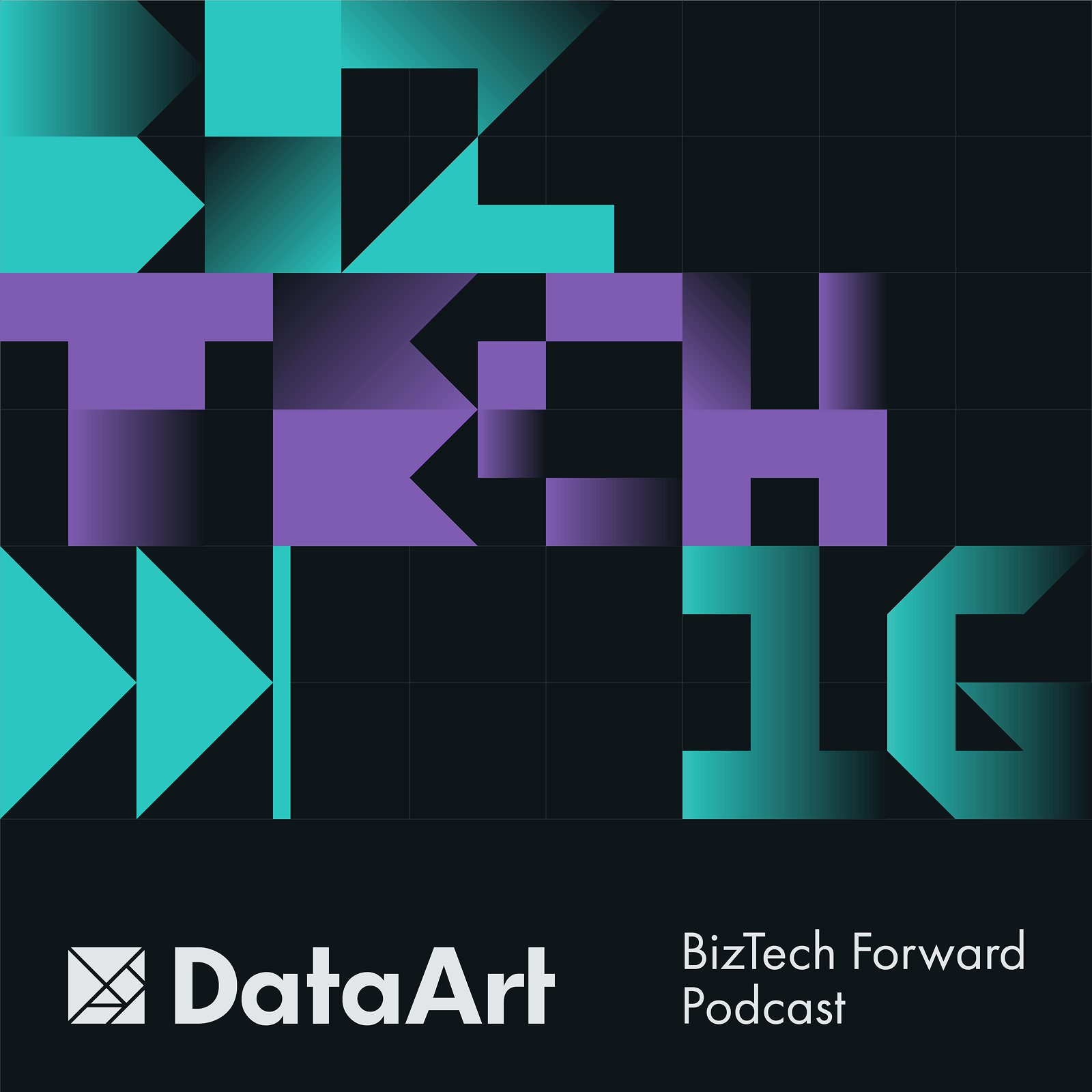
In this episode, Anni sits down with Alexey Utkin, Head of Data and Analytics Lab at DataArt, for a candid conversation about what’s really going on in the world of data.
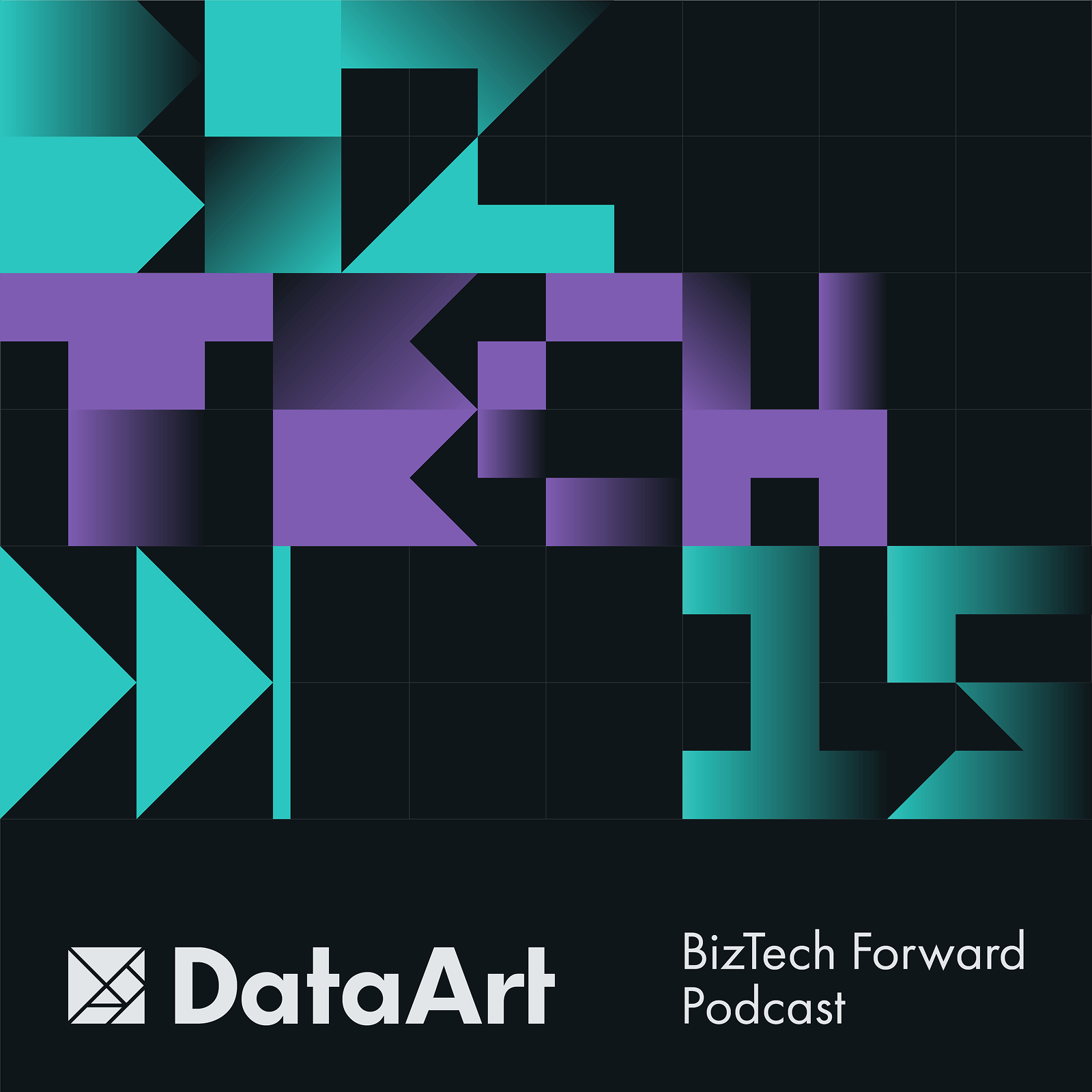
In this episode, Anni speaks with Olesya Khokhulia, VP of Global Enterprise Accounts at DataArt, about the evolution of client relationships, the quiet signals that build trust, and what it takes to stay relevant in an environment where expectations are always shifting.
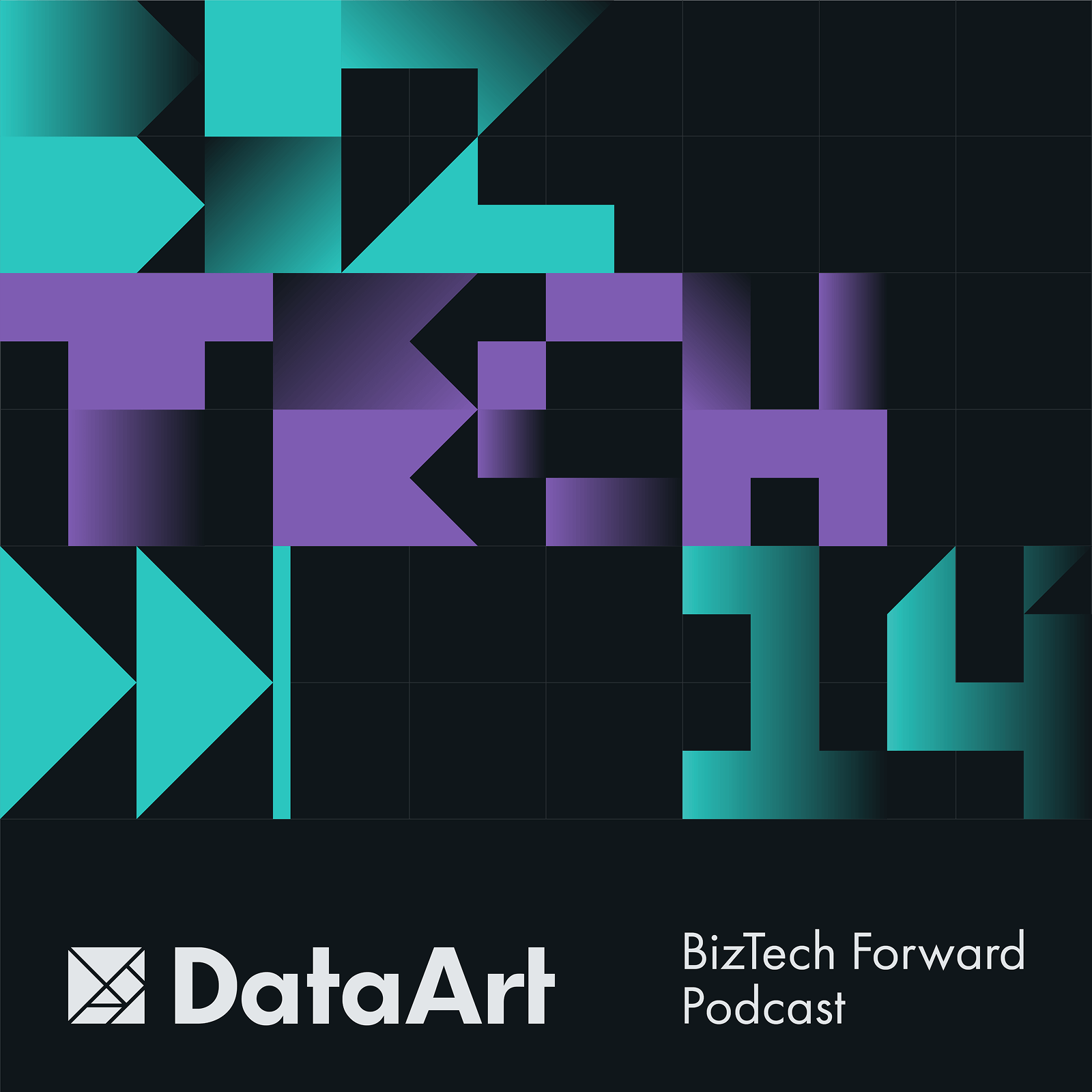
Travel is back — but it’s not the same. In this episode, we sit down with Greg Abbott, a veteran of the travel tech world with over three decades of experience, to talk about how the industry is evolving.

From ancient artifacts to AI-curated collections—art is evolving, and fast. In this episode, host Anni chats with Doron Fagelson, SVP of Media & Entertainment at DataArt, to explore how technology is transforming the art world, from online marketplaces to data-driven personalization and virtual galleries.

In this episode, host Anni chats with Julia Zavileyskaya, Chief People Officer at DataArt, about the biggest hiring trends, AI’s role in recruitment, and what really keeps employees engaged." Please find the episode's cover attached.
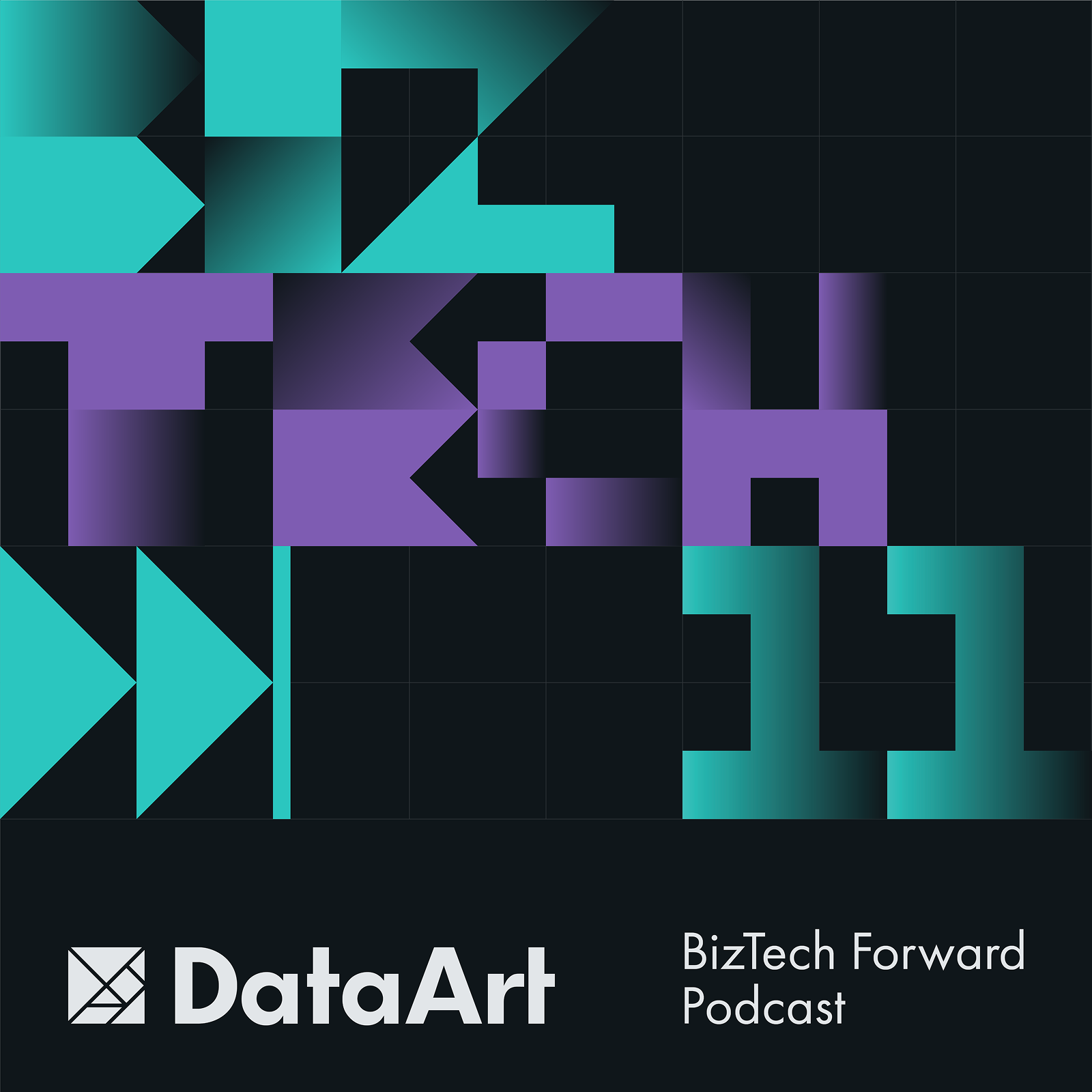
In this episode, Anni sits down with Marcos Mauro to discuss what’s fueling Latin America’s tech boom, how businesses and clients are adapting, and why it’s more than just an emerging market — it’s a global leader in the making.

In this episode of BizTech Forward, Anni chats with Maryna Melnik, Head of Learning and Development at DataArt, about how companies can create a culture of continuous learning, scale it across thousands of people, and deliver real business value.

In this episode of BizTech Forward, Anni sits down with Mike Peterson, Advisory CTO / CIO, Mentor, and Coach, who discusses how client expectations from IT vendors have evolved over the past decade, what clients miss from the ‘old days,’ and how vendors can stay ahead in an ever-changing tech landscape.

This is a bonus episode of BizTech Forward: Season One Recap. Host Anni takes you through the eight episodes of the debut season, highlighting some of the best moments and setting the stage for season two!

In this episode of BizTech Forward, Anni chats with Scott Rayburn, VP Marketing at DataArt, about how marketing has evolved with the rise of data and technology.

In this episode, Anni chats with Sheetal Kale, Head of DataArt India, about the country’s modern tech views, AI and data, IPO boom, and India’s gravitational pull in global decision-making.

In this episode, we're joined by Tim McMullen, a true veteran in aviation tech, to discuss the latest aviation technology trends from the latest industry conferences and the future of aviation.

In this episode of BizTech Forward, Anni sits down with Anastasia Rezhepp, DataArt's Head of Design Studio, to talk about the evolution of design processes in the world of UX.
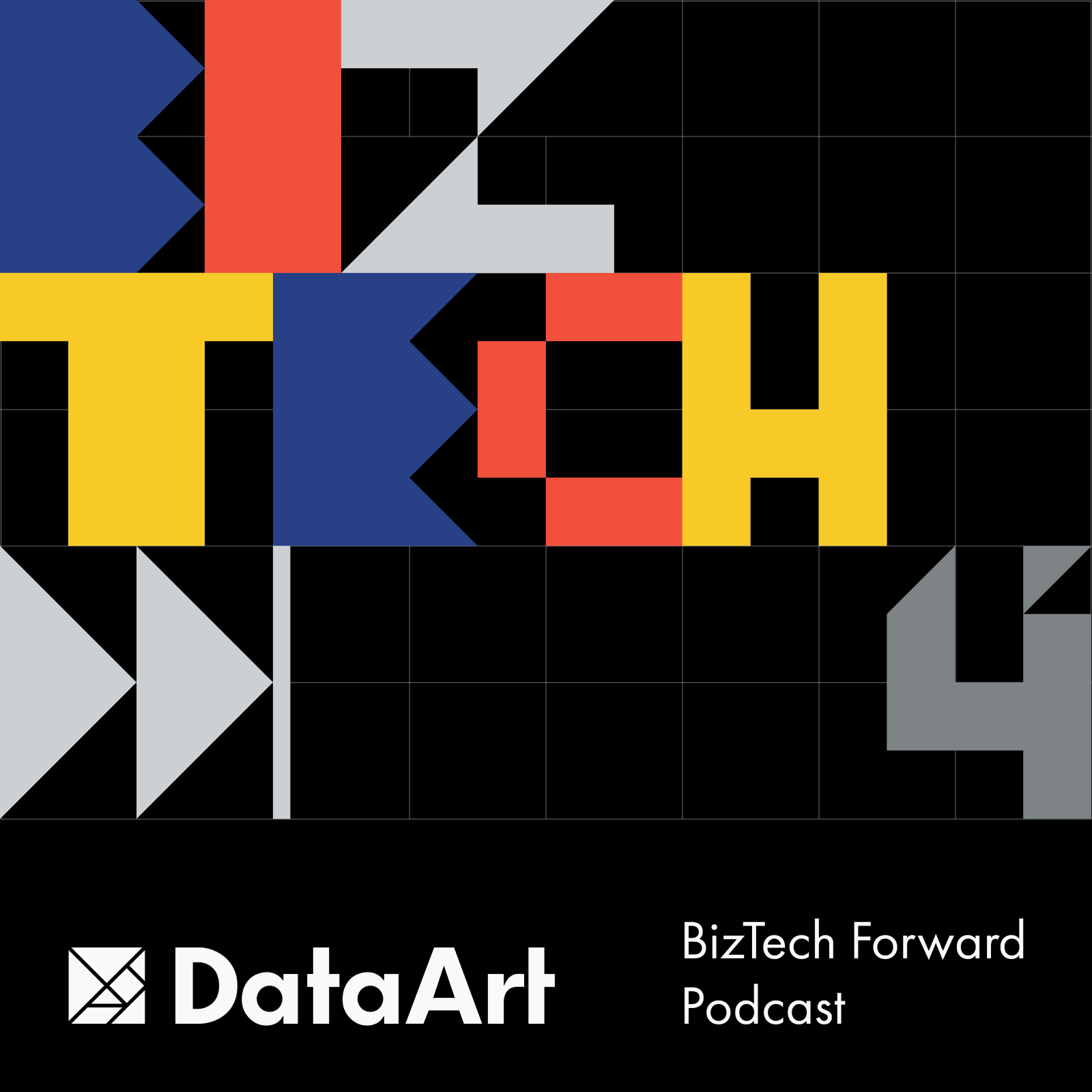
In this episode of BizTech Forward, we chat with Yuri Gubin, Chief Innovation Officer at DataArt, about why data quality is critical for AI success.

In this episode, we chat with Anna Velykoivanenko, Global Employer Branding Director at DataArt, about the perfect blend of technical know-how and human-centric skills.

In this episode of BizTech Forward, Anni from DataArt’s Media Relations team chats with Alexei Miller, Managing Director at DataArt, about how businesses can truly measure the value of their IT investments.
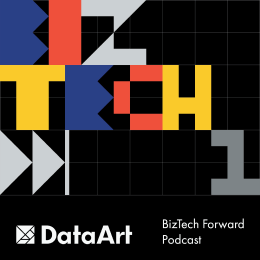
Join Anni Tabagua as we kick off our very first episode with a fascinating topic: AI in Automotive. Our guest is Dmitry Bagrov, the Managing Director of DataArt UK!
We Want to Hear From You!
Reach out to us with any comments, feedback, and questions by filling out the form.

Thank you for contacting us!
We will be in touch shortly to continue the conversation.







